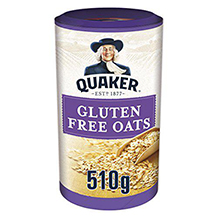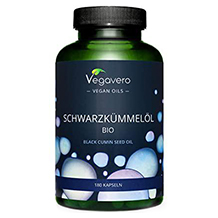Rose hip powder purchasing advice: how to choose the right product
- The most important facts in brief
- Rosehip powder is a food supplement with a particularly high vitamin C content.
- The anti-inflammatory active ingredient galactolipid contained in the rose hip helps with joint complaints and diseases such as arthritis or rheumatism.
- The preparation is not only available as a pure powder, but also in capsule form and as a tea.
- In addition to the dosage form, the most important purchase criteria include the ingredients, the mixing ratio of shell and seeds and the organic quality of the powder.
- Taken over several weeks, just a few grams of rose hip powder a day can have a positive effect on health.
Small fruit with a big effect
When most people think of rose hips, they probably think back to their childhood – be it the rose hip tea in kindergarten or the itching powder for simple pranks. Yet the bright red fruit is so much more multifaceted: its uses range from mythical customs to traditional medicine to stimulant.
An all-round talent with tradition
The traces of the rosehip go back a long way. Researchers have found seeds dating back to around 3000 BC. Even the Celts swore by the health-promoting effect of rose hips and therefore burned them during cultic rites. Since the Middle Ages, rose hips have been used to treat a wide variety of illnesses – from colds to stomach and intestinal disorders. In addition, the plant was closely associated with myths and superstitions. People used to try to ward off bad luck by eating rose hips at Christmas and at the beginning of the year. To keep evil spirits out, they nailed the fruit to the window. The background: because the rosehip defies even the harshest weather conditions, people attributed to it power over evil.
It is less well known that rose hips can also be processed into powder. Nowadays, it is used as a dietary supplement for joint complaints such as arthrosis or rheumatism, among other things. The preparation has antioxidant, anti-inflammatory and pain-relieving effects.
Dog-eared, but anything but ordinary
Rose hips are the fruits of the dog rose, also known as dog rose or Rosa canina. However, since the actual fruit is the seeds it contains, the rosehip is popularly known as a pseudo-fruit. The origin of the word “dog” goes back to the fact that the plant is “common to dogs”, i.e. it can be found everywhere. Its occurrence is by no means limited to South America. The one to five metre high shrubs also grow in our native regions on forest edges, rock piles and hedges.
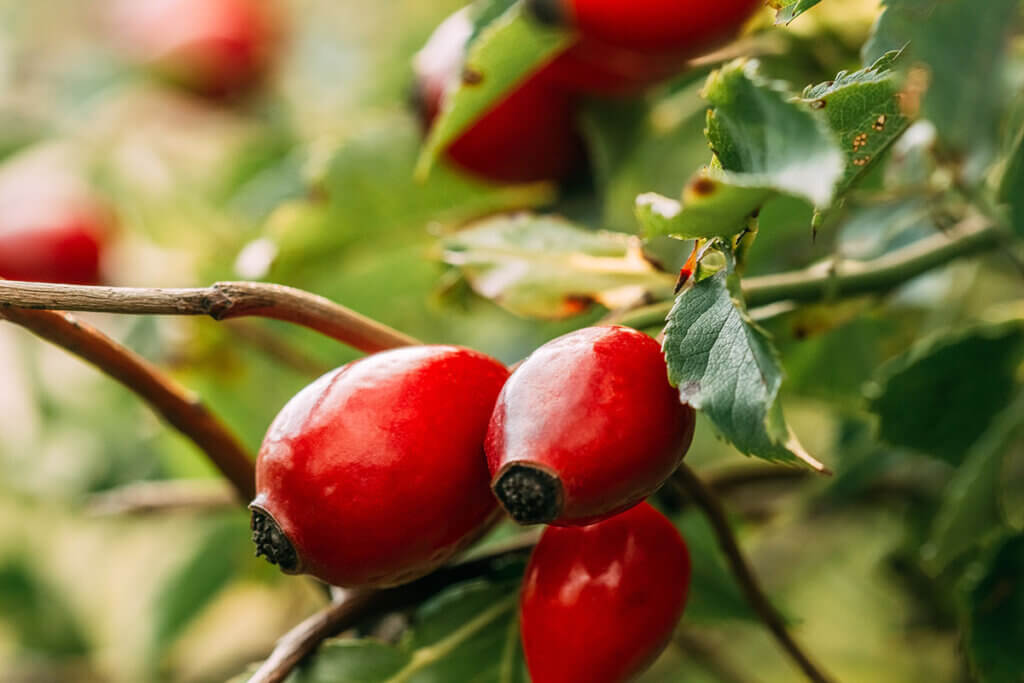
The fruit is harvested and finally processed together with the seeds and shell. The fine cilia must be removed first, as these can lead to the itching already mentioned or to allergies. To obtain powder, the fruit is dried and ground. To preserve the heat-sensitive ingredients, temperatures must not exceed 40 degrees Celsius. For this reason, rosehip powder is usually of raw food quality and thus has the full vitamin content.
The different forms of administration
In order to make the positive effects of rose hips available to everyone, the fruit is not only available in powder form, but also as capsules and as tea. Each form of administration has its own advantages and disadvantages.
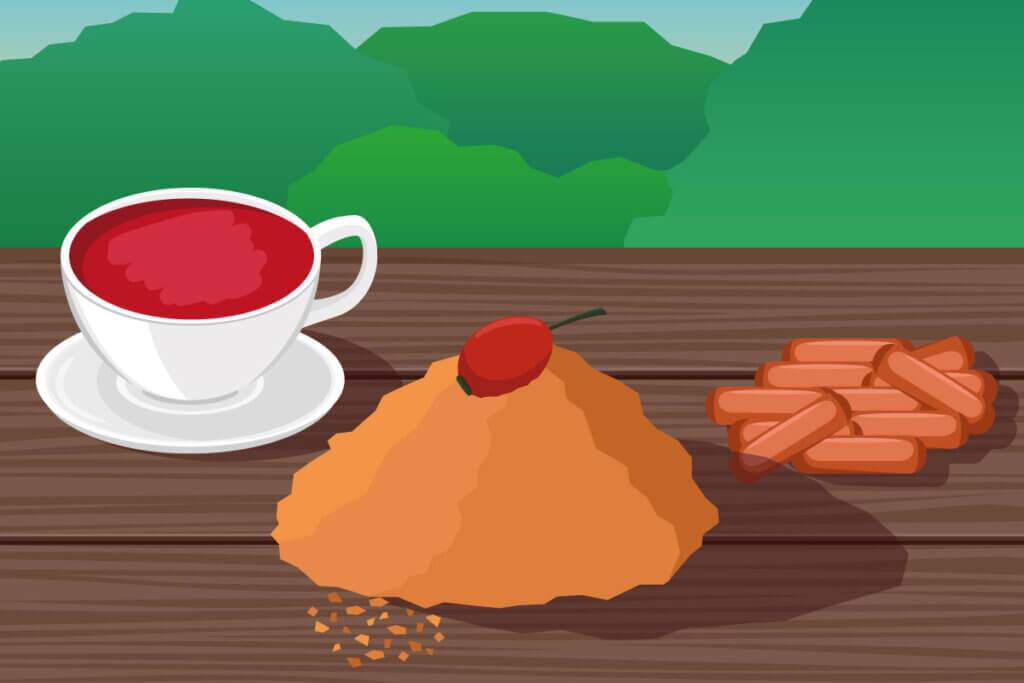
Loose rose hip powder
In principle, rose hip powder does not contain any additives or fillers, but there are also mixed versions, for example with acerola. The powder is usually packaged in bags or tins and can be purchased in various quantities from 100 to 1,000 grams. Compared to capsules, the powder form is usually cheaper. In addition to the variable dosage, the diverse intake options are also an advantage of this dosage form. For example, the powder can be consumed in muesli or yoghurt. The fruity-sour taste also goes perfectly with fruit smoothies.
Those who have problems swallowing tablets and capsules are better off with the powder. On the other hand, it is rather unsuitable when travelling: Since it cannot be taken pure, it always needs to be combined with a meal. In addition, it has to be dosed anew every day.
Advantages
- Without additives and fillers
- Wide range of intake options
- Easy to use
- Can be dosed individually
- Also available in bulk
- Naturally vegan and gluten-free
- Cheaper than capsules
Disadvantages
- Independent dosage necessary
- Unsuitable for travelling
Rosehip powder capsules
Rosehip capsules consist of pressed powder, enclosed in a capsule shell made of animal gelatine or cellulose. As they are already pre-dosed, there is no need to weigh them. Consequently, they are practical for on the go. The other side of the coin: individual dosage is not possible.
Although it is a good idea to take the capsules with meals, they can also be taken straight. The capsule form is ideal for those who do not like the fruity taste of rosehip. The capsules are tasteless because of their shell. On the other hand, it takes longer for the body to absorb the active ingredients because it first has to break down the shell. Due to the fillers contained in the capsules, the rose hip powder loses its purity in this dosage form. In addition, capsules are usually more expensive than powder.
Advantages
- Tasteless
- Pre-dosed
- Easy to use
- Optimal for on the go
Disadvantages
- Sometimes contains gelatine and fillers
- No individual dosage possible
- Release of active ingredient takes longer
- More expensive than loose powder
Rosehip tea, oil and jam
Rosehip can also be consumed as a tea. When administered in this way, the healing substances have a faster effect: as the body absorbs liquids more readily, the ingredients reach the organism more quickly. Most teas also contain other plants such as mallow blossoms. Although rosehip tea is not as highly dosed as the powder or capsules, it achieves similar positive effects. However, the high temperatures destroy the anti-inflammatory substances. In addition, a little more effort is required than with the loose powder and capsules.
Less common is rosehip oil, which is mainly for external use and helps with skin problems, among other things. Rosehip jam serves as a healthy alternative to spreads such as nut nougat cream.
What matters when buying
In addition to the form of presentation, other factors play a decisive role in the purchase. These include the ingredients, the mixing ratio and the quality of the rose hip powder.
The ingredients
If you want to use rose hip powder for your health, you should make sure that it does not contain any additives such as preservatives, anti-caking agents or sugar. Only pure powder has exclusively positive effects on the body. Moreover, this is the best way for the body to absorb and process it.
Additives, on the other hand, can not only reduce the active ingredient concentration of the rose hip powder, but can even have negative influences on the well-being. People with intolerances or vegans and vegetarians should pay more attention to the ingredients of the capsules. Powder, on the other hand, is enriched with other healthy additives or food supplements such as acerola. These lower the active ingredient concentration of the rosehip, but add other high-quality substances. In principle, however, it is both vegan and gluten-free.
The mixing ratio
Depending on the ratio of peels and seeds, the colour of rose hip powder varies between a dark red and an orange-brown. The more peel content there is, the more pronounced the red colour. On the one hand, the ratio depends on the location conditions, on the other hand, the manufacturers also change it deliberately in order to obtain certain product properties. For a particularly high vitamin C content and a beautiful red colour, they simply increase the proportion of peels in production. If, on the other hand, their focus is on the galactolipid content, more seeds must be included. In this case, the powder is lighter in colour.
The quality
Since rosehip powder is ideally taken daily and the fruits are processed without the use of high heat, it is advantageous to buy it in organic quality. In organic cultivation, the use of pesticides and fertilisers is only permitted to a limited extent. Compliance with organic standards is checked by regular inspections. Thus, the pollutant load of organic rosehip powder is significantly lower than that of fruit from conventional cultivation. The absence of chemical pesticides also increases the stress on the plant during its growth phase, which boosts its protective mechanisms and increases the galactopide content. In addition, the burden on nature is less.
Rosehip powders from wild collections usually have a higher nutrient density and, depending on the location, are hardly polluted. On the other hand, they are usually more expensive, just like the powder from organic cultivation.
The active ingredients and their effects
Rose hips contain numerous ingredients that have a positive effect on our health. In addition to vitamins A, B1 and B2, E, H, K and P, there are also minerals such as iron, magnesium, sodium and potassium as well as trace elements such as copper, zinc and calcium, pectins, flavones, fruit acids and secondary plant substances. Ultimately, it is the combination of ingredients that makes rosehip so valuable.
More than just a vitamin C bomb: the most important active ingredients
The most important ingredients of rose hips include the following:
Vitamin C

Depending on when they are harvested and how long and how they are stored, rose hips have a vitamin C content of about 500 milligrams per 100 grams. Compared to lemons, which contain only 50 milligrams of vitamin C per 100 grams, this is about ten times as much. Vitamin C strengthens the immune system, prevents colds and stimulates collagen synthesis. It also protects cells from oxidative stress, helps reduce fatigue and increases iron absorption.
Galactolipids

This substance, which consists of sugar and fatty acids, is a free radical scavenger that has an anti-inflammatory effect. The substance is used to treat various joint problems. It protects healthy joint cartilage and prevents white blood cells from penetrating the cartilage tissue to damage it. In addition, galactolipids have a positive effect on both CRP (the inflammation parameter) and LDL cholesterol (the “bad” component of blood fats), which leads to deposits in the vessels and arteriosclerosis.
Lycopene

Lycopene, the red pigment in rose hips, belongs to the carotenoids, which in turn have an antioxidant effect. The body forms vitamin A from this substance, which has a regenerating effect and is also important for healthy eyes and cell function. However, it only develops its full effect with other substances such as vitamin C, vitamin E and selenium. Lycopene scavenges harmful free radicals in the body and is said to have a positive effect on the cardiovascular system.
The natural sugars, namely fructose, glucose and sucrose, as well as the fruit and fatty acids support the formation of new joint cartilage. Fruit acids such as citric acid, malic acid and L-ascorbic acid play an important role in bladder and kidney problems. For example, they prevent the formation of bladder stones, kidney stones and regulate digestion naturally. Silicic acid is good for the skin, hair and nails, stimulates tissue formation and promotes cell regeneration. This helps acne, for example, to heal more quickly.
Polyphenols, the secondary plant substances and free radical scavengers, have a positive effect on blood pressure. These include, for example, the dark, water-soluble and antioxidant pigments anthocyanins and the strongly antioxidant and anti-inflammatory procyanidins. Potassium, a mineral, regulates the water balance and supports the heart muscles. The dietary fibre pectin has a positive effect on cholesterol levels and strengthens the digestive system.
The areas of application
Due to its valuable active ingredients, rosehip is used to support the healing of many different health complaints.
Healthy help for joint complaints
Galactolipids not only bind free radicals, but also act in the cells. They stabilise the cell membrane and enable the formation of new cartilage. In addition, galactolipids ensure that existing cartilage does not disintegrate. This relieves morning stiffness and reduces pain. The active ingredient can therefore also be used prophylactically. It protects the sensitive cartilage tissue from wear and tear and supports the body in regeneration.
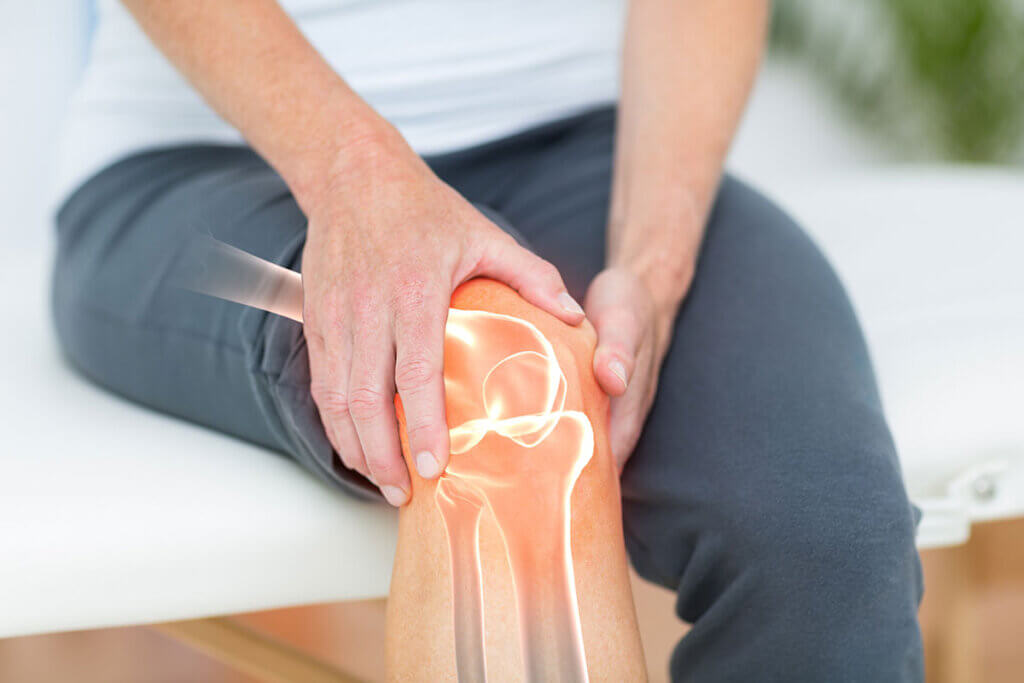
The disease rheumatism affects muscles, tendons and bones. Galactolipids relieve the pain of joint inflammation. In addition, the mobility in the joints improves because galactolipids prevent the release of free radicals, which in turn attack the joint cartilage.
Arthritis usually occurs temporarily in the form of joint inflammation. This is accompanied by redness and pain. Rosehip powder is suitable for prevention and offers faster healing in acute inflammations. Arthrosis, on the other hand, cannot be cured. In this degenerative joint wear and tear, the cartilage is affected, causing irreversible stiffening of the joints. The rose hip powder at least relieves the pain of movement and heals acute inflammations. Older people in particular benefit from the remedy, as they become more mobile and can participate more actively in life accordingly.
Other medicinal effects
Rosehip powder not only alleviates joint diseases, but is also often taken for the following complaints:
Arteriosclerosis

Arteriosclerosis causes calcification of the blood vessels. Calcium and cholesterol deposits build up in the veins, which in the long run prevents the transport of oxygen-rich blood. The consequences of this disease range from heart attack to thrombosis to stroke. The galactolipids contained in rose hips reduce the deposits and alleviate inflammation.
Liver and stomach aches
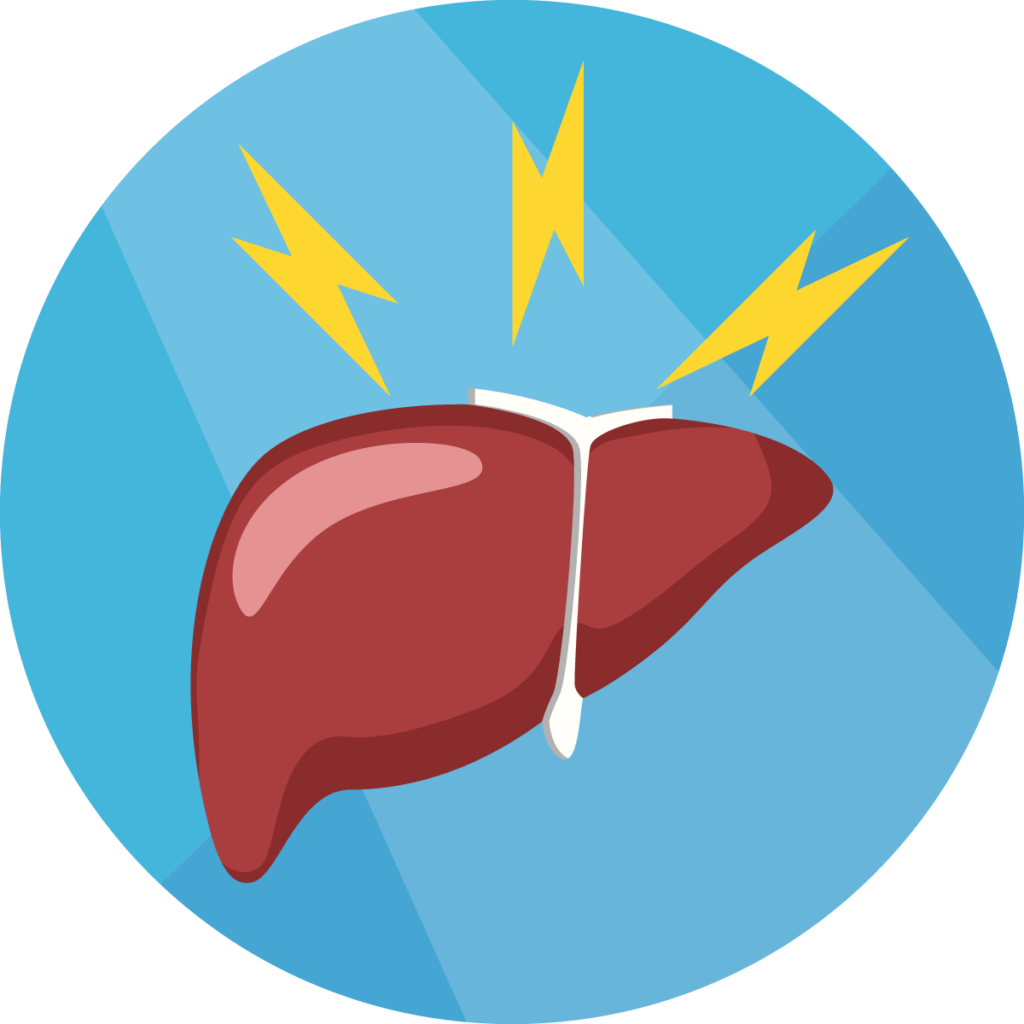
Rosehip powder can also relieve pain in the liver and stomach area. As a natural painkiller, it is far more tolerable for the digestive tract than aspirin or ibuprofen and is therefore particularly interesting for sufferers with a sensitive stomach. The liver benefits from the anti-inflammatory effect of the powder and, on top of that, is not burdened with chemical painkillers.
Kidney diseases
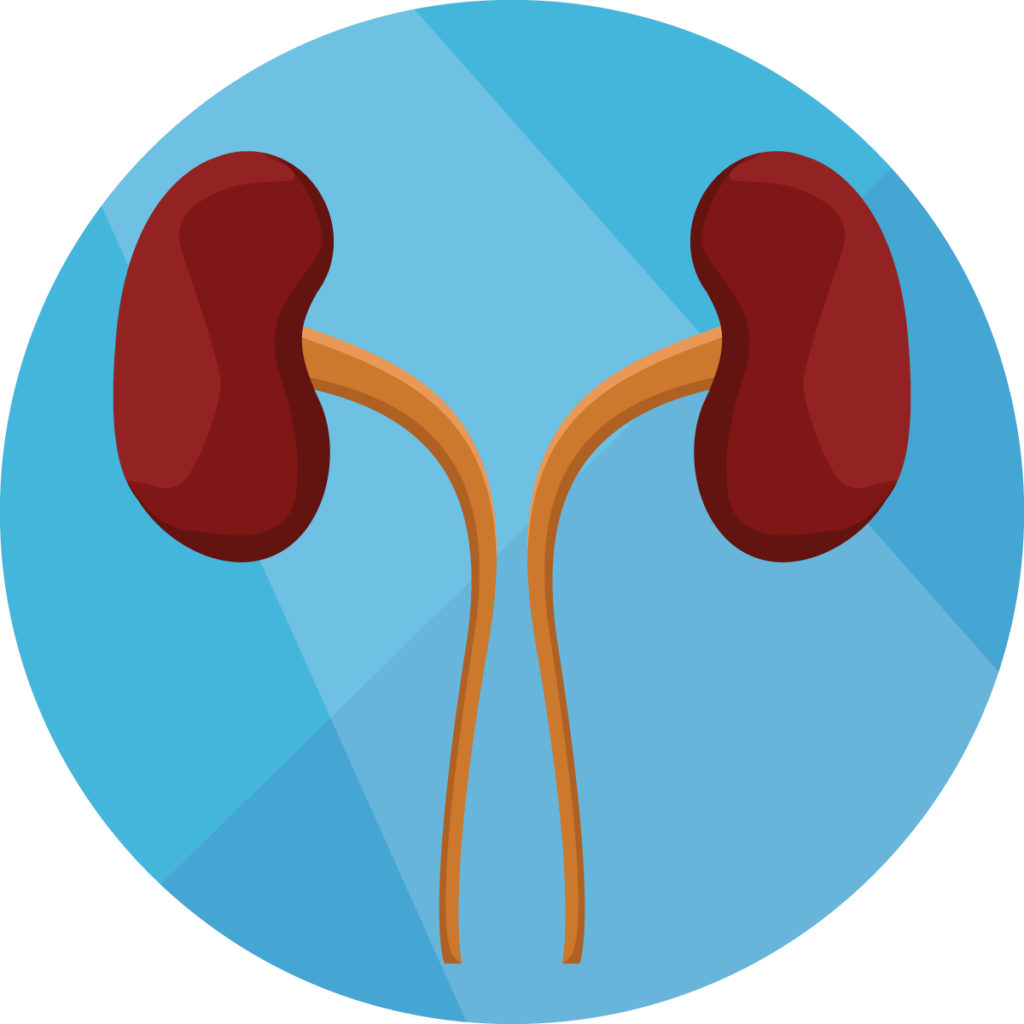
To flush the kidneys and better eliminate dead cells, germs and harmful substances, it helps to drink a lot. Rosehip tea comes in handy here in two ways: On the one hand, it has a diuretic effect, and on the other, its active ingredients ensure that the kidneys heal more quickly.
Skin diseases
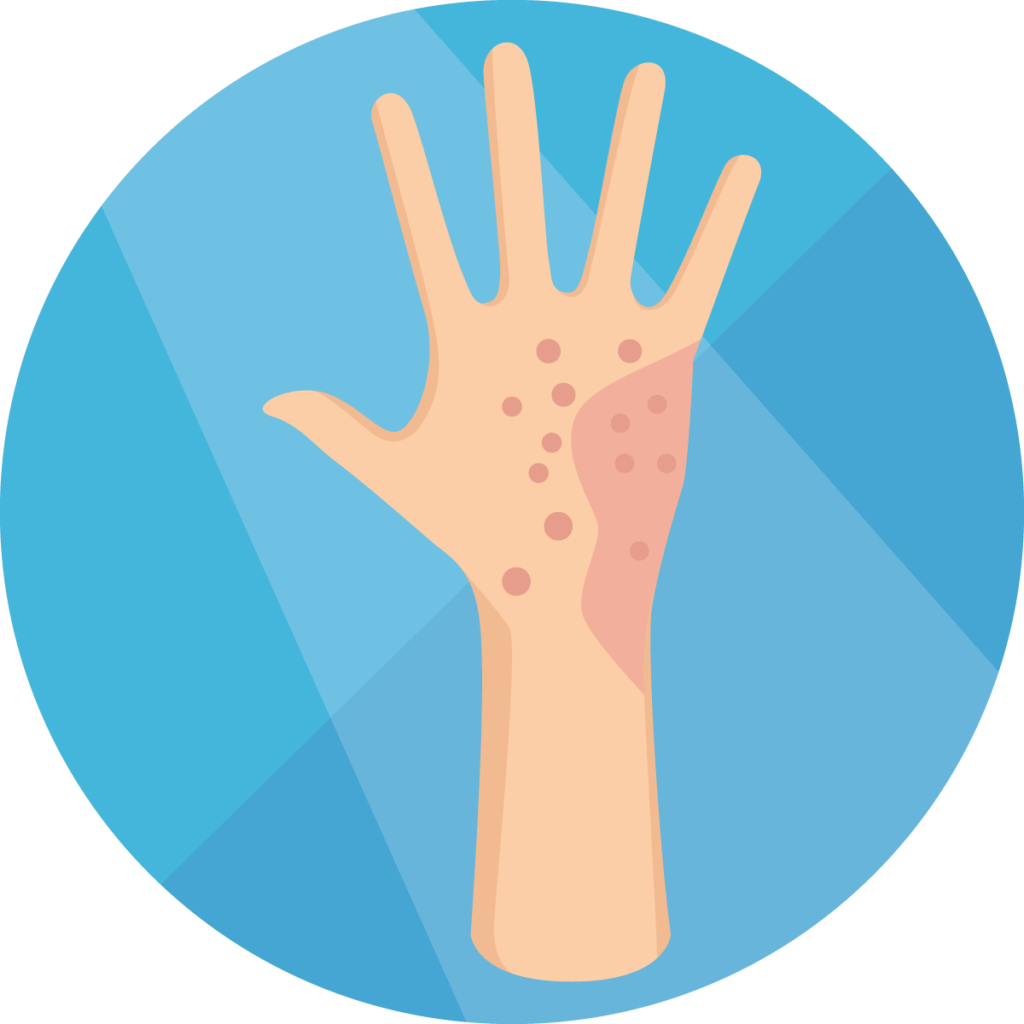
The anti-inflammatory effect of rosehip soothes acute skin diseases. Especially the externally applied rosehip oil treats dry patches, psoriasis, neurodermatitis or wrinkles. It also relieves symptoms such as redness, swelling, itching and tension of the skin. It can also be used to treat scars, sunburns, mosquito bites and allergic reactions.
Heart and circulatory disease

Cardiovascular diseases mainly affect blood vessels. Cholesterol leads to deposits, which in turn cause vein constriction. This increases blood pressure. Thanks to its high vitamin C content in combination with its blood pressure and cholesterol-lowering properties, rosehip powder has a positive effect on the cardiovascular system.
Urinary tract infections

In case of a urinary tract infection, it is important to flush the bladder regularly to flush out suppurations and bacteria. Rosehip powder or tea has a mild diuretic and diuretic effect. Its anti-inflammatory properties fight the infection directly. Vitamin C intake also boosts the body’s defences.
Strengthening the immune system

Rosehip powder supplies your body with a lot of vitamin C, which strengthens the immune system. Rosehip powder therefore helps to replenish empty vitamin C stores. In times of increased need, such as during a cold, stress or pregnancy, the intake is particularly recommended.
However, we always recommend consulting a doctor before taking the preparation as a substitute for medicine.
Does rose hip powder also work for animals?
In dogs, cats and horses, rose hip powder is used to treat inflammation and nervousness, among other things. It also helps to strengthen the immune system.
Intake and dosage
If you collect rose hips in your local forest, you can even make the powder yourself with a little effort. Ideally, pick the fruits in late autumn or winter. The later the harvest, the sweeter the yield. If you have already harvested the fruit before the first sub-zero temperatures, we advise you to put it in the freezer for two days before processing. This increases the sugar content.
Then proceed as follows:
- Cut the fruit lengthwise and loosen the blossoms, stems as well as the seeds completely.
- Remove the cilia and wash the fruit thoroughly.
- Spread the flesh out on a cloth and leave it to dry in a warm place for at least two days. To speed up the process, place it in the oven (at no more than 40 degrees Celsius) or an automatic dehydrator.
- Grind the dried pulp in a stand mixer.
- Transfer the mixture into a jar and let them dry further.
As the powder is sensitive to heat, ideally store it in a cool, dark and dry place.
Continuity pays off
In order for the product to take effect, it is important that you take the powder continuously over a longer period of time (at least one to two months). For example, the powder only has an anti-inflammatory effect after about ten days. Once you have consumed the remedy for more than six months, we advise a two-week break.
The dietary fibres contained in the powder have an effect on digestion. More precisely, the water-insoluble fibres bind water and swell up. To avoid depriving the digestive system of too much water, we recommend drinking a glass of water, especially when taking rosehip capsules. This helps to avoid gastrointestinal complaints. Take the powder with or between meals and mix it with cold or lukewarm liquid, a muesli, yoghurt or fruit puree. Ideally, leave the mixture for five to ten minutes to soak in the liquid and allow it to infuse.
Healthy and delicious: recipe ideas
You can also use the powder for chocolates and energy balls, among other things. Other possibilities are a rose hip porridge with bananas, apples and chia seeds or a rose hip smoothie with berries.
Just one spoonful a day
Although the exact dosage recommended by the manufacturers varies between 2.5 and 10 grams daily, on average you do not need more than 5 grams or a heaped teaspoon of the powder per day. In any case, follow the instructions on the packaging.
Side effects of rose hip powder are not known. However, taking more than 40 grams per day can lead to gastrointestinal complaints. So make sure that you do not overdose the medicine. If you nevertheless notice a deterioration in your health, you should consult a doctor immediately.

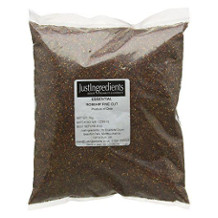
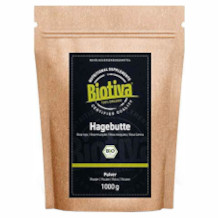

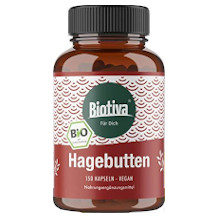
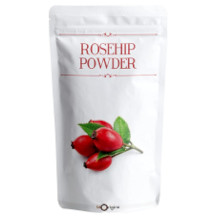
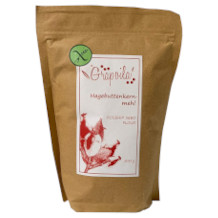
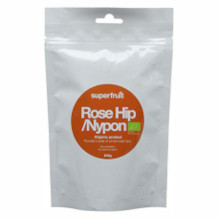

 1,643 reviews
1,643 reviews
